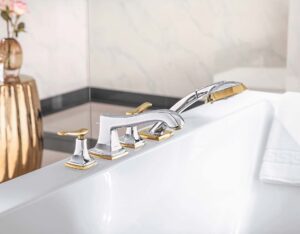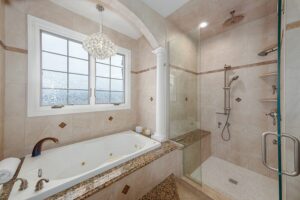When it comes to enhancing the luxury experience of your hotel guests, the quality of bathroom fixtures, especially shower heads, plays a crucial role. As procurement managers, real estate developers, and distributors, evaluating the performance of LED shower head suppliers effectively ensures you offer innovative, high-quality products while maintaining cost-effectiveness.
To effectively evaluate LED shower head suppliers, consider factors such as product quality, innovation, certifications, logistics, cost-effectiveness, and reliable after-sales service. Address common challenges like shipping delays, inconsistent product quality, and customization issues to ensure a seamless procurement process.
Let’s delve deeper into each of these crucial factors to help you make an informed decision when choosing your LED shower head suppliers.
What is Shower Head Performance Rating?
Shower head performance rating primarily revolves around the gallons per minute (GPM) flow rate. Since 1992, a maximum of 2.5 GPM is the federally mandated flow rate for new shower heads, ensuring water efficiency without compromising performance. Opt for suppliers who offer products meeting or exceeding this standard, as it indicates their commitment to quality and efficiency.
To evaluate the performance rating effectively, you should also consider other factors such as spray pattern, pressure, and coverage area. A good shower head provides a consistent and comfortable water flow, regardless of the water pressure in the building. Test the products yourself or request samples from the suppliers to assess these factors. Additionally, look for customer reviews and feedback on the supplier’s products to gauge user satisfaction. Suppliers who frequently receive positive feedback about the performance and durability of their shower heads are more likely to provide reliable products.
Why Did My LED Shower Head Lights Stop Working?
LED shower heads often face issues due to heavy water gunk, grime, and salts build-up. Regular maintenance, such as cleaning with white vinegar or commercial products like CLR, can prevent these problems. Evaluate suppliers based on the durability and ease of maintenance of their products. Suppliers offering detailed maintenance guides and customer support can be more reliable.
In addition to maintenance, consider the quality of the LED components used in the shower heads. High-quality LEDs should have a long lifespan and be resistant to water and steam. Ask suppliers about the specifications of the LEDs, such as their expected lifespan and water resistance ratings. A reliable supplier will use high-quality, durable components and provide warranties for their products. Furthermore, inquire about the ease of replacing the LEDs if they do fail. A good supplier should offer replacement parts and easy-to-follow instructions for fixing common issues.
What is Considered an Efficient Shower Head?
An efficient shower head uses no more than 2.0 GPM, meeting the WaterSense label requirements. These showerheads are designed to conserve water while maintaining a powerful spray. When evaluating suppliers, prioritize those who provide WaterSense-certified products, ensuring both efficiency and performance.
Efficiency is not just about water usage; it also includes energy efficiency. Water-saving shower heads reduce the amount of hot water used, leading to energy savings as well. This is particularly important for hotels and large facilities where numerous showers are in use daily. When evaluating suppliers, ask about the overall water and energy savings their products can provide. Additionally, consider the environmental impact of the materials used in the shower heads. Suppliers who use eco-friendly materials and sustainable manufacturing processes are more likely to align with your company’s values and goals.
How Many GPM is Good for a Shower Head?
Standard shower heads use 2.5 GPM, but WaterSense-labeled products must use no more than 2 GPM. Evaluate suppliers who offer a range of flow rates, allowing you to choose products that best suit your needs while ensuring water conservation. The EPA estimates that the average family could save 2,900 gallons of water per year by installing a WaterSense-labeled shower head.
When choosing the GPM for your shower heads, consider the specific needs of your customers. Some may prefer a stronger flow for a more luxurious shower experience, while others may prioritize water conservation. Suppliers who offer customizable options for flow rates can provide more flexibility. Additionally, consider the compatibility of the shower heads with different water pressures. A shower head that performs well at low pressures can be beneficial in areas where water pressure is an issue. Evaluate the supplier’s ability to provide products that meet these varying requirements to ensure you can cater to a broader customer base.
Certifications and Compliance
Certifications and compliance with international standards are crucial when evaluating suppliers. Ensure that the suppliers provide certifications from accredited third-party testing laboratories. These certifications indicate adherence to quality and safety standards, ensuring you receive reliable and high-quality products.
Certifications to look for include ISO 9001 for quality management systems and CE marking for compliance with European safety standards. Additionally, certifications like WaterSense and WRAS (Water Regulations Advisory Scheme) indicate that the products meet specific environmental and water efficiency standards. When evaluating suppliers, request copies of these certifications and verify their validity. A reputable supplier will be transparent about their compliance and willing to provide all necessary documentation. Furthermore, consider the supplier’s track record in maintaining these certifications over time. Consistent compliance demonstrates their commitment to quality and regulatory standards.
Product Innovation and Quality
Innovation is a key factor in the LED shower head market. Look for suppliers who offer products with advanced features such as color-changing LEDs based on water temperature and water-saving technologies. Assess the materials used in manufacturing for durability and longevity. High-quality materials, such as corrosion-resistant metals and robust plastics, indicate a commitment to quality.
Innovative features not only enhance the user experience but also add value to your offerings. For instance, color-changing LEDs can provide a visual indicator of water temperature, enhancing safety and comfort. Water-saving technologies, such as aerated spray nozzles, can reduce water usage without compromising the shower experience. When evaluating suppliers, ask about their research and development capabilities. Suppliers who invest in R&D are more likely to offer cutting-edge products and stay ahead of market trends. Additionally, consider their ability to customize products to meet your specific requirements. Customizable options, such as different LED colors or spray patterns, can help you differentiate your offerings in the market.
Logistics and Reliable Delivery
Logistics can significantly impact your procurement process. Evaluate suppliers based on their ability to provide reliable and timely delivery. Suppliers with a track record of meeting delivery deadlines and offering transparent communication about shipping schedules and delays are more dependable. Consider their geographic location and shipping partners to ensure efficient logistics.
Reliable logistics are crucial for maintaining project timelines and avoiding costly delays. When evaluating suppliers, ask about their shipping processes and partnerships with logistics companies. Suppliers who work with reputable logistics providers are more likely to offer reliable and timely deliveries. Additionally, consider their ability to handle large orders and manage inventory effectively. Suppliers who can scale their operations to meet your demands are more valuable partners. Request information on their average lead times, shipping costs, and policies for handling delays or damages. A supplier with a robust logistics network and clear communication channels can significantly reduce the risk of supply chain disruptions.
Cost-Effectiveness
Balancing quality and cost is essential in procurement. While high-quality products might come at a premium, the long-term benefits often outweigh the initial costs. Evaluate suppliers based on the value they offer for the price. Suppliers who provide competitive pricing without compromising on quality or features are ideal partners.
Cost-effectiveness involves more than just the purchase price. Consider the total cost of ownership, which includes maintenance, energy savings, and the lifespan of the products. High-quality shower heads that last longer and require less maintenance can save money in the long run. When evaluating suppliers, ask for detailed pricing information, including any bulk purchase discounts or financing options. Compare the costs and benefits of different suppliers to determine the best value for your investment. Additionally, consider the supplier’s willingness to negotiate terms and provide customized solutions to meet your budget constraints. A flexible and cost-effective supplier can help you maximize your procurement budget without sacrificing quality.
After-Sales Service and Long-Term Relationships
Reliable after-sales service is crucial for long-term satisfaction. Evaluate suppliers based on their customer support and warranty offerings. Suppliers who offer comprehensive after-sales support, including easy returns, replacements, and responsive customer service, can help maintain a smooth procurement process. Building long-term relationships with such suppliers can lead to better deals and more reliable service in the future.
After-sales service is an indicator of the supplier’s commitment to customer satisfaction. When evaluating suppliers, ask about their warranty policies and the process for handling returns or replacements. A supplier who offers a generous warranty and hassle-free returns is more likely to stand behind their products. Additionally, consider their customer service responsiveness. Suppliers who provide prompt and helpful support can quickly address any issues that arise, minimizing disruptions. Building long-term relationships with reliable suppliers can lead to benefits such as priority service, customized solutions, and potential cost savings through negotiated terms. Evaluate the supplier’s track record in maintaining long-term relationships and their willingness to collaborate on future projects.
Evaluating the performance of LED shower head suppliers effectively involves a thorough assessment of product quality, innovation, certifications, logistics, cost-effectiveness, and after-sales service. By addressing common pain points and focusing on these key factors, you can ensure a seamless procurement process that enhances the luxury experience for your customers.




